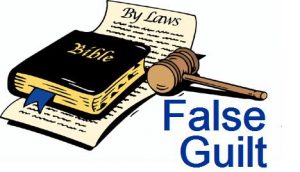Choices change our lives…
By Barbara Dahlgren

Jesus came so we could have life and have it more abundantly (John 10:10). This is not referring to health and wealth. It’s telling us that Jesus came to give us eternal life, plus we have an even more abundant life because while here on earth, Jesus resides in us. We have a relationship with Him.
Unfortunately, there are factors wanting to hinder that relationship. The Bible warns that there are thieves trying kill, destroy, and steal that relationship with Jesus from us (John 10:10). I think one of those thieves is false guilt.
I like to classify guilt into two categories: real guilt and false guilt.
For the Christian, real guilt comes from going against our conscience. We want our conscience in agreement with God’s standard. Then it can let us know when we’ve blown it or sinned. At these times, it is only natural to feel remorse for what we’ve done. Real guilt helps us acknowledge when we’ve done something wrong, but it doesn’t condemn us to a life sentence of punishment, like Satan would have us believe (John 3:17; Romans 8 1-2). We bring these mistakes before God and He forgives us (Ephesians 1:7; Psalm 32:1-2). He remembers our sins no more (Hebrews 8:14).
However, false guilt is different. False guilt comes from us not living up to our own standard of righteousness, not God’s. We might feel guilty because we ate fast food, don’t pray enough, don’t study our Bibles enough, aren’t involved at church, need to lose weight, don’t serve at the homeless shelter, or haven’t called our parents in a week. These feelings are painful, but it’s not real guilt, which is the result of not living up to God’s standards. It’s false guilt trying to masquerade itself as real guilt because these are our own self-imposed standards.
For example, let’s say we feel guilty because we don’t study our Bibles enough every day. How much time does God say we should spend on personal Bible study every day? Well, He doesn’t really say, does He? There are biblical principles to study God’s Word but God gives us the freedom to decide how often and how long. We might want to set a standard of so much Bible study a day, but we have to realize this is our standard, not God’s. So there should be no real guilt connected to it if we fall short of our own expectation. This would be false guilt because we haven’t done anything wrong.
Another example might be feeling guilty because we didn’t give enough in the offering basket last week. How much money does God say we should give as an offering each week? Well, He doesn’t really say, does He? The Old Testament had a specific tithing command but the New Testament does not. However, there is a biblical principle of giving to God and generously. However, we have the freedom to decide how much, to whom, and so on. We might want to give more than ten percent. We aren’t limited in what we do in this area. Actually the amount we give is not as important as how we give it anyway – from the heart. We have the freedom to decide how much.
The Old Covenant was all about lists of “dos and don’ts.” The New Covenant is about Jesus living His resurrected life in us. We do not earn salvation; it is a free gift.
Consider this… The Bible tells us that problems occurred when Christians wanted to impose the Old Testament practice of circumcision on new Gentile converts. They tried to make the Gentiles feel like they weren’t Christians unless they got circumcised. Major guilt trip! Paul had to set them straight (Galatians 5:2). Is circumcision wrong? Of course not! But it was not and is not necessary for salvation.
In so many areas of our lives, God gives us the freedom to decide, using biblical principles as guides – without condemnation. Someone else might try to put us on a guilt trip because we don’t want to teach Sunday School, serve on the PTA, or run in a marathon for cancer, but God does not. There is freedom in Christ. We can’t do everything, so God gave us the freedom to prayerfully decide what to do and what not to do, without feeling guilty.
One final thought… Get over the “not doing enough” syndrome. We will never be able to “do enough!” If we could, we wouldn’t need God.


